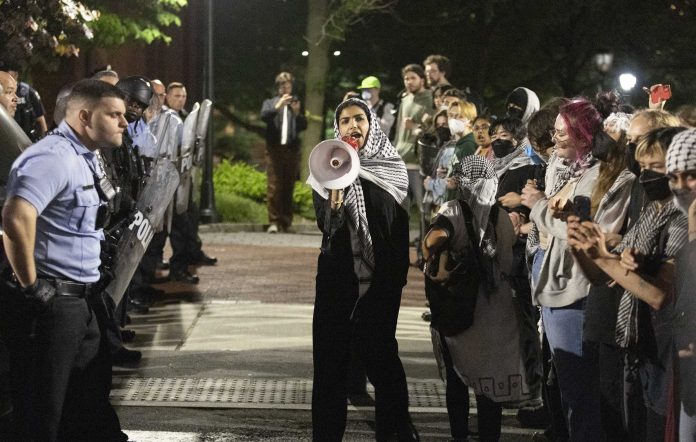
Associated Press
PHILADELPHIA (AP) — Pro-Palestinian protesters ignored a request by Drexel University’s president to disband their encampment on Monday as arrests linked to campus demonstrations against the Israel-Hamas war surpassed the 3,000 mark nationwide.
Drexel’s campus remained on lockdown, with classes being held virtually as police kept watch over the demonstration on the school’s Korman Quad. Many Drexel employees were told to work from home.
In a statement issued a day earlier, Drexel President John Fry said as many as 60 protesters were at the encampment, lambasting it as “intolerably disruptive to normal university operations.” He said there were “serious concerns about the conduct of some participants, including distressing reports and images of protestors subjecting passersby to antisemitic speech, signs and chants.” Fry threatened disciplinary action against Drexel students participating in the protest.
The Drexel Palestine Coalition responded on Instagram late Sunday that “it is slander to accuse the encampment of ‘hateful’ or ‘intimidating’ actions when we have done neither.” The group accused Drexel and city police of harassment and intimidation. A pro-Palestinian group of faculty and staff blasted Fry on Monday for shuttering campus facilities and said the encampment was “not disruptive to learning.”
The Drexel protesters’ demands ranged from the university administration calling for a ceasefire in Gaza and divesting from companies that do business with Israel, to abolition of the Drexel police department and termination of the school’s chapter of Hillel, the Jewish campus organization.
No arrests were reported.
Students and others have set up tent encampments on campuses around the country to press colleges to cut financial ties with Israel. Tensions over the war have been high on campuses since the fall but demonstrations spread quickly following an April 18 police crackdown on an encampment at Columbia University.
More than 3,000 people have been arrested on U.S. campuses over the past month. Campuses have been calmer recently, with fewer arrests, as students leave for summer break. Still, colleges have been vigilant for disruptions to commencement ceremonies.
At the University of California, Santa Cruz, graduate students went on strike Monday as part of a rolling, systemwide protest over how administrators have responded to pro-Palestinian encampments, including arrests of protesters at the Los Angeles, San Diego and Irvine campuses.
The encampment at Drexel, which has about 22,000 students, was set up after several hundred demonstrators marched from Philadelphia’s City Hall to west Philadelphia on Saturday. Nearby, on the University of Pennsylvania campus, university and city police arrested 19 demonstrators Friday night, including six Penn students.
On Monday, Philadelphia District Attorney Larry Krasner declined to charge four of the Penn protesters, citing a lack of evidence submitted by campus police. Krasner’s office approved misdemeanor charges against three others. The remaining 12 arrested Friday night were given citations for failing to disperse.
Penn’s main commencement ceremony, meanwhile, was held Monday under tightened security and a ban on flags and signs. There were no disruptions.
Elsewhere, Wesleyan University in Connecticut said it has reached agreement with student protesters to review possible divestment, with meetings scheduled for later this month and in the fall. Wesleyan President Michael Roth announced the deal over the weekend and disclosed that 1.7% of Wesleyan’s endowment was invested in aerospace and defense businesses, but that none were directly involved in the manufacture of weapons.
As part of the agreement, Wesleyan protesters cleared their encampment on Monday, according to a school spokesperson.
The Associated Press has recorded at least 82 incidents since April 18 where arrests were made at campus protests across the U.S. At least 3,025 people have been arrested on the campuses of 61 colleges and universities. The figures are based on AP reporting and statements from universities and law enforcement agencies.
The latest Israel-Hamas war began when Hamas and other militants stormed into southern Israel on Oct. 7, killing around 1,200 people and taking an additional 250 hostage. Palestinian militants still hold about 100 captives, while Israel’s military has killed more than 35,000 people in Gaza, according to Gaza’s Health Ministry, which doesn’t distinguish between civilians and combatants.



















